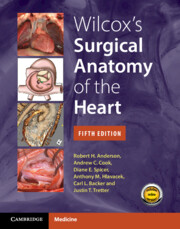1027 results
9 - Lesions in Hearts with Abnormal Segmental Connections
-
- Book:
- Wilcox's Surgical Anatomy of the Heart
- Published online:
- 10 April 2024
- Print publication:
- 02 May 2024, pp 299-406
-
- Chapter
- Export citation
8 - Lesions with Normal Segmental Connections
-
- Book:
- Wilcox's Surgical Anatomy of the Heart
- Published online:
- 10 April 2024
- Print publication:
- 02 May 2024, pp 175-298
-
- Chapter
- Export citation
Chapter 4 - Surgical Anatomy of the Valves of the Heart
-
- Book:
- Wilcox's Surgical Anatomy of the Heart
- Published online:
- 10 April 2024
- Print publication:
- 02 May 2024, pp 77-112
-
- Chapter
- Export citation
Chapter 11 - Positional Anomalies of the Heart
-
- Book:
- Wilcox's Surgical Anatomy of the Heart
- Published online:
- 10 April 2024
- Print publication:
- 02 May 2024, pp 465-477
-
- Chapter
- Export citation
Copyright page
-
- Book:
- Wilcox's Surgical Anatomy of the Heart
- Published online:
- 10 April 2024
- Print publication:
- 02 May 2024, pp iv-iv
-
- Chapter
- Export citation
Acknowledgements
-
- Book:
- Wilcox's Surgical Anatomy of the Heart
- Published online:
- 10 April 2024
- Print publication:
- 02 May 2024, pp viii-viii
-
- Chapter
- Export citation
Chapter 7 - Analytic Description of Congenitally Malformed Hearts
-
- Book:
- Wilcox's Surgical Anatomy of the Heart
- Published online:
- 10 April 2024
- Print publication:
- 02 May 2024, pp 153-174
-
- Chapter
- Export citation
Chapter 5 - Surgical Anatomy of the Coronary Circulation
-
- Book:
- Wilcox's Surgical Anatomy of the Heart
- Published online:
- 10 April 2024
- Print publication:
- 02 May 2024, pp 113-132
-
- Chapter
- Export citation
Chapter 1 - Surgical Approaches to the Heart
-
- Book:
- Wilcox's Surgical Anatomy of the Heart
- Published online:
- 10 April 2024
- Print publication:
- 02 May 2024, pp 1-10
-
- Chapter
- Export citation
Index
-
- Book:
- Wilcox's Surgical Anatomy of the Heart
- Published online:
- 10 April 2024
- Print publication:
- 02 May 2024, pp 478-482
-
- Chapter
- Export citation
Preface
-
- Book:
- Wilcox's Surgical Anatomy of the Heart
- Published online:
- 10 April 2024
- Print publication:
- 02 May 2024, pp vii-vii
-
- Chapter
- Export citation
Contents
-
- Book:
- Wilcox's Surgical Anatomy of the Heart
- Published online:
- 10 April 2024
- Print publication:
- 02 May 2024, pp v-vi
-
- Chapter
- Export citation
Chapter 3 - Anatomy of the Cardiac Chambers
-
- Book:
- Wilcox's Surgical Anatomy of the Heart
- Published online:
- 10 April 2024
- Print publication:
- 02 May 2024, pp 41-76
-
- Chapter
- Export citation
Chapter 6 - Surgical Anatomy of Cardiac Conduction
-
- Book:
- Wilcox's Surgical Anatomy of the Heart
- Published online:
- 10 April 2024
- Print publication:
- 02 May 2024, pp 133-152
-
- Chapter
- Export citation
10 - Abnormalities of the Great Vessels
-
- Book:
- Wilcox's Surgical Anatomy of the Heart
- Published online:
- 10 April 2024
- Print publication:
- 02 May 2024, pp 407-464
-
- Chapter
- Export citation

Wilcox's Surgical Anatomy of the Heart
-
- Published online:
- 10 April 2024
- Print publication:
- 02 May 2024
Empowering the Participant Voice (EPV): Design and implementation of collaborative infrastructure to collect research participant experience feedback at scale
-
- Journal:
- Journal of Clinical and Translational Science / Volume 8 / Issue 1 / 2024
- Published online by Cambridge University Press:
- 06 February 2024, e40
-
- Article
-
- You have access
- Open access
- HTML
- Export citation
Anxiety in late-life depression: Associations with brain volume, amyloid beta, white matter lesions, cognition, and functional ability
-
- Journal:
- International Psychogeriatrics , First View
- Published online by Cambridge University Press:
- 25 January 2024, pp. 1-12
-
- Article
-
- You have access
- HTML
- Export citation
4 Evaluating Plasma GFAP for the Detection of Alzheimer’s Disease Dementia
-
- Journal:
- Journal of the International Neuropsychological Society / Volume 29 / Issue s1 / November 2023
- Published online by Cambridge University Press:
- 21 December 2023, pp. 408-409
-
- Article
-
- You have access
- Export citation
5 Antemortem Plasma GFAP Predicts Alzheimer’s Disease Neuropathological Changes
-
- Journal:
- Journal of the International Neuropsychological Society / Volume 29 / Issue s1 / November 2023
- Published online by Cambridge University Press:
- 21 December 2023, pp. 409-410
-
- Article
-
- You have access
- Export citation



